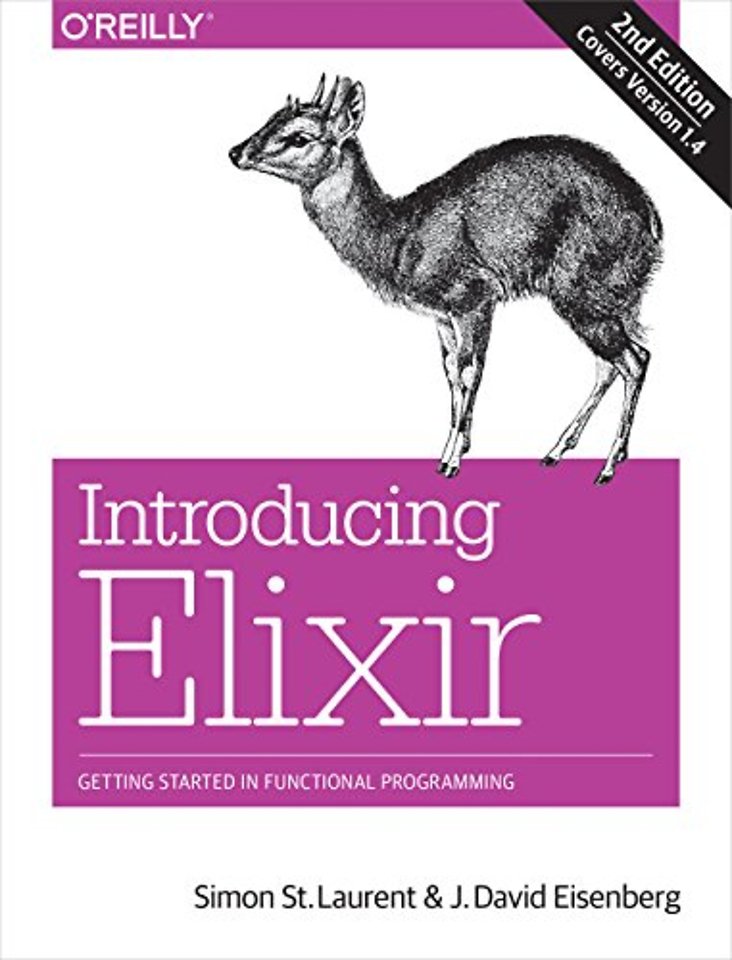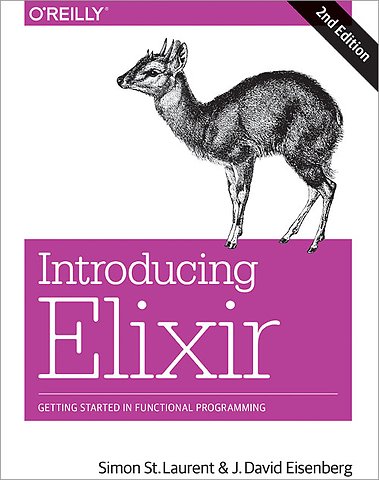


Simon St. Laurent is Senior Editor at O'Reilly Media, Inc., focusing primarily on JavaScript and web-related projects.
Meer over de auteursIntroducing Elixir
Getting Started in Functional Programming
Paperback Engels 2016 2e druk 9781491956779Samenvatting
Smooth, powerful, and small, the Elixir programming language is an excellent place for newcomers to learn about functional programming. This book shows readers how Elixir combines the robust functional programming of Erlang with an approach that looks more like Ruby. Readers will learn how Elixir simplifies some of Erlang's odder corners and reaches toward metaprogramming with powerful macro features.
Introducing Elixer is ideal for developers new to programming as well as experienced developers who want to move into functional programming.
- Get comfortable with IEx, Elixir's command line interface
- Become familiar with Elixir’s basic structures by working with numbers
- Discover atoms, pattern matching, and guards: the foundations of your program structure
- Delve into the heart of Elixir processing with recursion, strings, lists, and higher-order functions
- Create processes, send messages among them, and apply pattern matching to incoming messages
- Store and manipulate structured data with Erlang Term Storage (ETS) and the Mnesia database
- Build resilient applications with the Open Telecom Platform (OTP)
- Define macros with Elixir's meta-programming tools
Specificaties
Lezersrecensies
Over David Eisenberg
Inhoudsopgave
1. Getting Comfortable
-Installation
-Firing It Up
-First Steps
-Doing Something
-Calling Functions
-Numbers in Elixir
-Working with Variables in the Shell
2. Functions and Modules
-Fun with fn
-And the &
-Defining Modules
-From Module to Free-Floating Function
-Splitting Code Across Modules
-Combining Functions with the Pipe Operator
-Importing Functions
-Default Values for Arguments
-Documenting Code
-Documenting Functions
-Documenting Modules
3. Atoms, Tuples, and Pattern Matching
-Atoms
-Pattern Matching with Atoms
-Atomic Booleans
-Guards
-Underscoring That You Don’t Care
-Adding Structure: Tuples
4. Logic and Recursion
-Logic Inside of Functions
-The Gentlest Side Effect: IO.puts
-Simple Recursion
5. Communicating with Humans
-Strings
-Multiline Strings
-Unicode
-Character Lists
-String Sigils
-Asking Users for Information
6. Lists
-List Basics
-Splitting Lists into Heads and Tails
-Processing List Content
-Creating Lists with Heads and Tails
-Mixing Lists and Tuples
-Building a List of Lists
7. Name-Value Pairs
-Keyword Lists
-Lists of Tuples with Multiple Keys
-Hash Dictionaries
-From Lists to Maps
-From Maps to Structs
8Higher-Order Functions and List Comprehensions
-Simple Higher-Order Functions
-Creating New Lists with Higher-Order Functions
-Beyond List Comprehensions
9. Playing with Processes
-The Shell Is a Process
-Spawning Processes from Modules
-Lightweight Processes
-Registering a Process
-When Processes Break
-Processes Talking Amongst Themselves
-Watching Your Processes
-Breaking Things and Linking Processes
10. Exceptions, Errors, and Debugging
-Flavors of Errors
-Rescuing Code from Runtime Errors as They Happen
-Logging Progress and Failure
-Tracing Messages
-Watching Function Calls
-Writing Unit Tests
11. Storing Structured Data
-Records: Structured Data Before structs
-Storing Data in Erlang Term Storage
-Storing Records in Mnesia
12. Getting Started with OTP
-Creating Services with gen_server
-A Simple Supervisor
-Packaging an Application with Mix
13. Using Macros to Extend Elixir
-Functions versus Macros
-A Simple Macro
-Creating New Logic
-Creating Functions Programatically
-When (Not) to Use Macros
-Sharing the Gospel of Elixir
Appendix A: An Elixir Parts Catalog
Appendix B: Generating Documentation with ExDoc
Index
Anderen die dit boek kochten, kochten ook
Rubrieken
- advisering
- algemeen management
- coaching en trainen
- communicatie en media
- economie
- financieel management
- inkoop en logistiek
- internet en social media
- it-management / ict
- juridisch
- leiderschap
- marketing
- mens en maatschappij
- non-profit
- ondernemen
- organisatiekunde
- personal finance
- personeelsmanagement
- persoonlijke effectiviteit
- projectmanagement
- psychologie
- reclame en verkoop
- strategisch management
- verandermanagement
- werk en loopbaan





